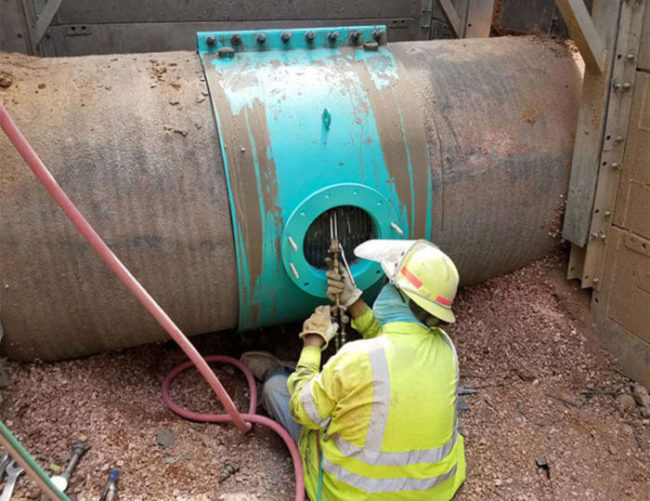
PCCP Case Study: Explosive Myths Busted
Pre-stressed concrete cylinder pipe safe for tapping and more
Overview
Prestressed concrete cylinder pipe (AWWA C301) gets a bad rap. Despite rumors and outdated information, the pipe is in service in all 50 states. First installed after World War II, PCCP is one of the most rigid and long-lasting pipes. However, misunderstanding about today’s manufacturing process and how it performs under pressure causes some to leave it out of consideration. Thompson Pipe Group sets the record strength.
Fact:
Prestressing is achieved by helically wrapping, under measured tension and at uniform spacing, a high-tensile strength wire around the concrete-lined steel cylinder.
Myth:
Due to the tension, PCCP wires unravel with cut.
Fact:
When wires are cut the pipe stays intact due to the concrete mortar coating. To prove the point, we cut wires on a 48”.
Myth:
If damaged while in service, the pipe will explode.
Fact:
This pressurized pipe was struck more than 100 times with an excavator bucket. The break caused water to flow out, but not much else.
Myth:
A PCCP line cannot be expanded or tapped.
Fact:
The Thompson Pipe Group Pipeline Services Department provides historical records, parts, engineering and field services support to tap and expand PCCP lines. For example, a 42” lined prestressed concrete cylinder pipe was installed in the 1960s. To meet the demands of population growth, the owner requested two taps. The 8’’ and 12’’ taps were successfully installed with Thompson Pipe Group parts and support.
Myth:
PCCP corrodes easily which causes the wire to fail and the pipe to explode.
Fact:
PCCP is highly resistant to corrosion due to the Portland cement rich mortar coating. With the exception of pipe from one supplier (Interpace), manufactured between 1970 and 1972, PCCP has an excellent service record.
